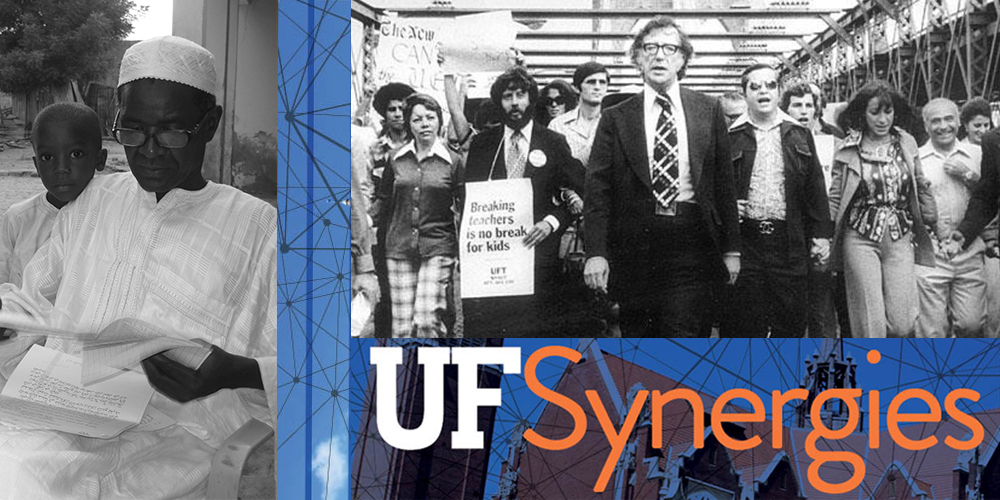
- This event has passed.
UF Synergies: Language, Policing, and Schools
February 8, 2021 @ 5:00 pm

Please pre-register for the event through the Zoom link.
Professor Fiona McLaughlin (Languages, Literatures, and Cultures), Rothman Faculty Fellow: “In Pursuit of Trans-Saharan Literacies”
Dominant regimes of literacy in the Sahara, the Sahel, and the Maghreb are in Arabic and French, yet parallel vernacular literacies in African languages are used by many communities in this vast area. Two such writing systems whose use spans the geographic area of the Trans-Sahara, are ajami, or the writing of African languages in the Arabic script, and tifinagh, an ancient Libyco-Berber script used to write Tamazight or Berber languages. Tracing the transmission and spread of these writing traditions through pathways of Islamization, Islamic education in Qur’anic schools, and pastoralist traditions, sheds doubt on the construction of the Sahara as a barrier between north and sub-Saharan Africa, and supports the framing of a trans-Saharan region of shared historical, religious, and linguistic influences.
David Meltsner (History), Tedder Family Doctoral Fellow: “The United Federation of Teachers and the Making of the School-To-Prison Pipeline”
In the 1970s, the United Federation of Teachers advocated for policies that established a foundation for the school-to-prison pipeline, a development that disproportionately pushes Black and Latino students out of school and into a punitive criminal justice system. By highlighting and politicizing disorder in the city’s public schools, the UFT convinced lawmakers, city Board of Education officials, media, and the public to support policies and protocols that increasingly criminalized students. These measures entailed the heightened surveillance of students by both security personnel and new technologies, such as closed circuit television, walkie talkies, and alarm systems, the suspension and expulsion of “disruptive” or “violent” students, and the utilization of police services to address delinquency and truancy.
Rachal Burton (Ph.D. Candidate, English), Tedder Family Doctoral Fellow: “Slavery, War, and Colonialism in the Work of Toni Morrison”
Rachal Burton’s dissertation project discusses the major themes present in the late Nobel Prize-winning author Toni Morrison’s work: slavery, war, and colonialism. She argues that Morrison employs symbolism in her Pulitzer Prize-winning novel Beloved (1987) and narrative form in her more recent neo-slave narrative A Mercy (2008) to illustrate that her Black main characters are positioned by what sociologist Orlando Patterson refers to as “natal alienation” or “social death.” She then examines how war exists as a trope in many of Morrison’s novels, specifically in Sula (1973), which features Black World War I and II veterans Shadrack and Plum, and her 21st-century work Home (2012), which highlights a Black Korean War veteran named Frank Money. Lastly, she argues that in Tar Baby (1981) Morrison contrasts the racial positionality (or ontology) of various characters as Human with that of others who exist as “accumulated and fungible objects.” Similarly, in Paradise (1997), Rachal demonstrates how Morrison highlights the inextricable relationship between colonialism, Indigenous genocide, and anti-Blackness.